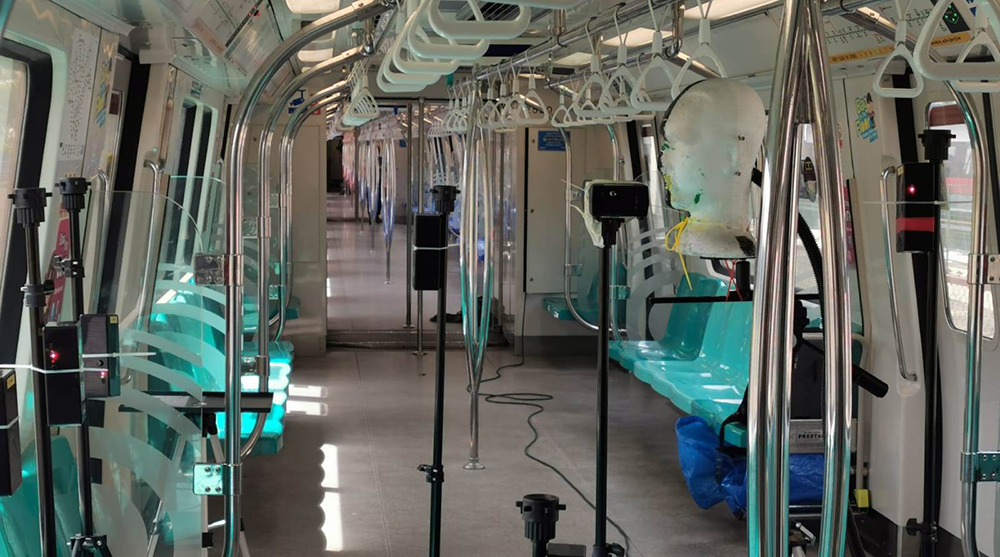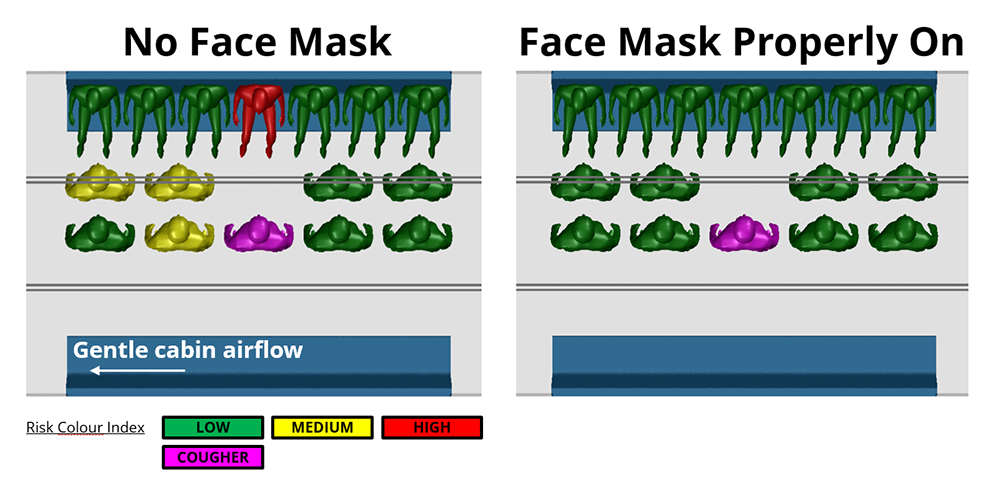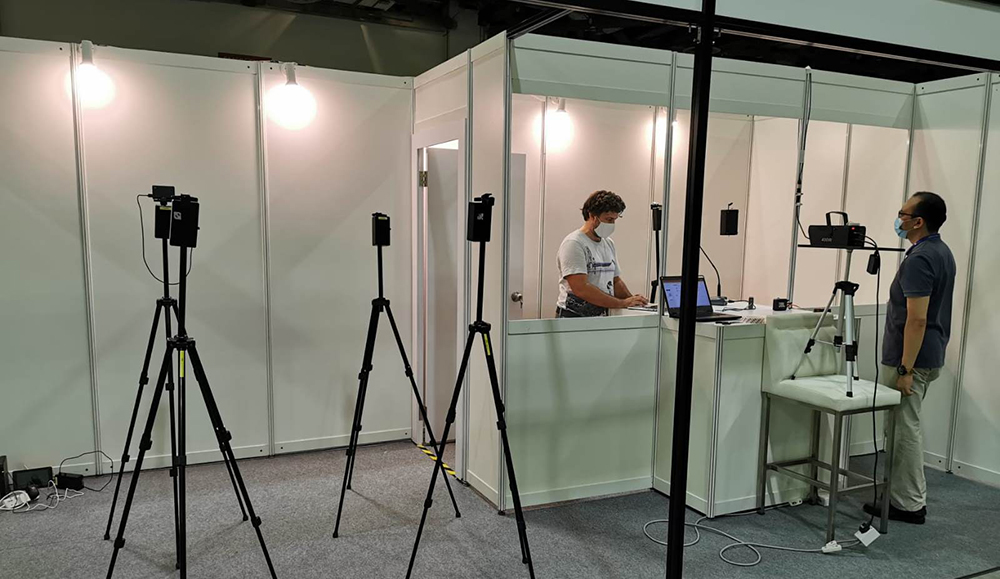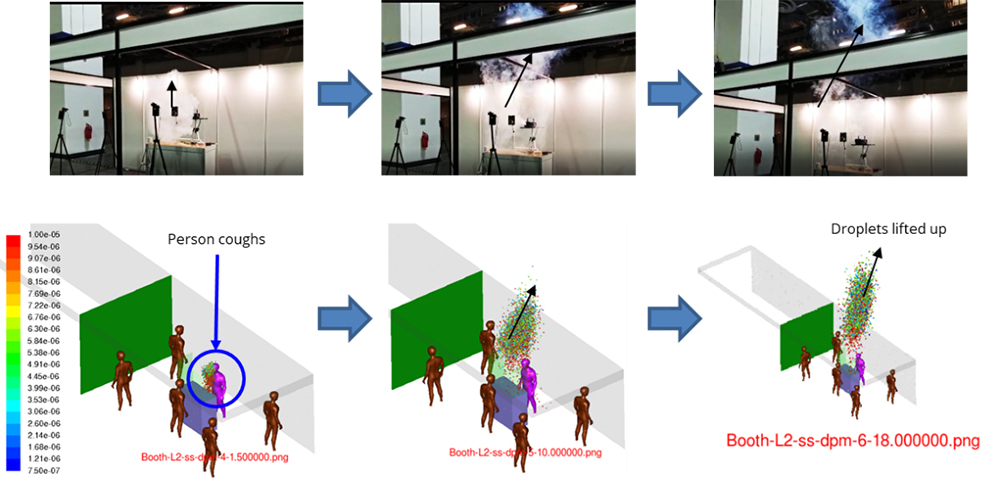A*STAR NEWS
Partnering the research ecosystem to boost safe reopening of Singapore
To support the safe and gradual resumption of activities in Singapore, the Agency for Science, Technology and Research (A*STAR) has partnered several public agencies, private sector companies and institutes of higher learning in scientific studies related to wearing of masks, and minimising the risks of transmission through droplets and aerosols.
In particular, A*STAR’s scientific work on airflow modelling and simulation, as well as experimental design and particle sensing capabilities have been trialled with public transportation, and at various public venues such as concert theatres, offices and eateries .
The insights gleaned from these research findings could be useful in further reducing the risk of COVID-19 transmission, and supplement the current safe management measures.
Engaging Public Agencies to Facilitate Safe Reopening

Experimental design of smoke spread in a moving train cabin
A*STAR has worked with the Land Transport Authority (LTA) to model the dispersion of droplets and aerosols on public transportation, and developed recommendations using the findings.
The study looked into the dispersion of droplets and aerosols due to the complex interaction of the train airflow, number of commuters, and the motion of the train. The research revealed that when a train is moving at a constant speed, commuters next to a cougher face a medium-to-high risk of infection if they are not masked. This highlight the importance of safe management measures such as wearing of masks, ensuring proper hygiene and to avoid talking when on board trains.

The above diagram simulates the risk index of commuters in a moving train without (left) and with (right) face masks.

Scientists from A*STAR’s Institute of Materials Research and Engineering (IMRE) analysed the risk levels of different exhibition booth designs in experiments which simulated the movement of airborne droplets. A booth design with a full plexi-glass barrier is shown here.
Similar work has been carried out with the Singapore Tourism Board (STB) to facilitate the safe resumption of M.I.C.E activities. Such trials will help agencies look into and implement measures that will allow events to take place safely, by helping them address factors that contribute to virus spread such as crowd sizes, distancing between people, and confined spaces with poor ventilation.

Trajectories of droplets flow due to a person coughs in front of plexi-glass, visualised by (top) experiment and (bot) computer simulation.
“One of the pre-conditions for entering phase 3 of reopening our economy is the adherence to safe management measures. By employing a science-based approach to the design of safe management measures, we are able to assess the risks of transmission and advise tangible mitigation measures that are built on the foundation of scientific evidence. The multi-disciplinary expertise from across the local research ecosystem leveraged in these studies, make them very valuable for public agencies and businesses,” said Professor Alfred Huan, Assistant Chief Executive, Science & Engineering Research Council, A*STAR.
Safeguarding Our Public Spaces
Temasek Foundation, A*STAR and other research partners such as ITE College East, and Temasek Life Sciences Laboratory (TLL), have done extensive scientific studies in collaboration with public agencies, and gleaned insights which could be useful in further reducing the risk of COVID-19 transmission.
Environmental mitigation measures such as ventilation in spaces, air filters, air ionisers, table-top dividers, and UVC lights have been found to be effective in reducing fomites, and concentrations of droplets and aerosols in the air at test venues such as public transportation, concert theatres, offices and eateries.
Project Safeguard is an educational initiative by Temasek Foundation aimed at raising public awareness about such scientific findings from our local R&D ecosystem, plus potential solutions to help reduce the risk of COVID-19 transmission as we carry on economic and social activities.
This initiative aims to help communities enhance safe management practices at work and social places in support of public health needs as we progressively reopen our economy.
Ms Koh Lin-Net, Chief Executive, Temasek Foundation Nurtures, said: “Wearing masks, practising hand hygiene and keeping safe distancing have become norms. But as the situation continues to evolve, we must also continue to add to our knowledge base. These would not just be useful to reduce COVID-19 transmission risks, but will also give us toolkits which could help reduce our risks during the next unknown Disease X which could have aerosol as its main route of transmission.”
Ms Koh noted, “We are highly privileged to have the opportunity to partner with the Agency for Science, Technology and Research (A*STAR) and other research partners, including ITE College East and Temasek Life Sciences Laboratory (TLL), who have provided answers to some of our questions on additional measures to take, especially in dealing with aerosols. We would like to share this with the wider public, so that we can collectively build a foundation for our future generations to stay prepared, and safeguard our community in the event of a future outbreak.”
Next Steps
The COVID-19 situation is unpredictable. A*STAR stands ready to bring scientific rigour to determining appropriate measures to the safe reopening of the economy. We are working closely with relevant ministries and agencies to provide timely advice on lowering risks of transmission during events and activities. Working alongside the wider research community, we continue to pursue related studies to deepen our understanding on the factors that affect various environmental mitigation measures.
Scientists from across Singapore’s research ecosystem continue to work towards increased modelling and empirical methods. Working under the guidance of the Ministry of Health’s Chief Health Scientist, Prof Tan Chorh Chuan, this network of scientists has been researching how transmission of COVID-19 could occur and how much spread could be mitigated. These studies will help to bolster the safe opening of Singapore’s economy and society through the implementation of robust mitigation measures.
Was This Article Helpful ?
A*STAR celebrates International Women's Day

From groundbreaking discoveries to cutting-edge research, our researchers are empowering the next generation of female science, technology, engineering and mathematics (STEM) leaders.
Get inspired by our #WomeninSTEM
